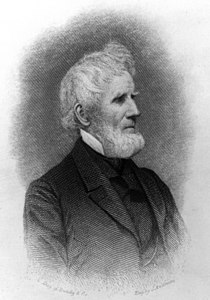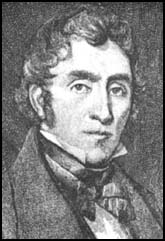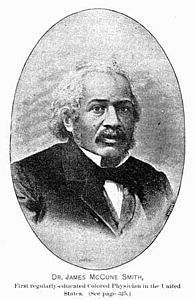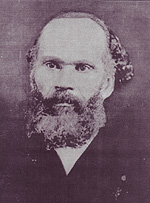The Emancipator (newspaper)
 | |
| Type | Weekly newspaper |
|---|---|
| Owner(s) | American Anti-Slavery Society (1833–1836) Liberty Party (1840–1850) |
| Founder(s) | Arthur Tappan |
| Editor | Joshua Leavitt (1840–1848) |
| Founded | March 1833 |
| Political alignment | Abolitionist |
| Language | English |
| Ceased publication | December 26, 1850 |
| City | New York City (1833–March 1844) Boston (1842–1850) |
| Country | United States |
The Emancipator (1833–1850) was an American abolitionist newspaper, at first published in New York City and later in Boston. It was founded as the official newspaper of the American Anti-Slavery Society (AASS). From 1840 to 1850, it was published by the Liberty Party; the publication changed names several times as it merged with other abolitionist newspapers in Boston.
Contributors to the paper included Lewis Tappan (of the Amistad case), James McCune Smith (who also co-edited The Colored American), Joseph Cammett Lovejoy, Samuel Edmund Sewall, Henry Brewster Stanton, Horace Edwin Smith, William Ellery Channing, and William Stevens Robinson.[1]
History[edit]
The Emancipator was founded in March 1833 in New York City by Arthur Tappan, a wealthy abolitionist and president of the American Anti-Slavery Society. The March 1833 publication marked the beginning of the abolitionist movement in New York state.[2] The Emancipator's first editor was Charles Wheeler Denison.
African-American sales agents selected to represent the new publication included:
- David Ruggles, New York City, who was the general agent[a]
- John D. Closson, Newark, New Jersey
- Thomas Van Rensslear, Princeton, New Jersey
- Abraham Doras Shadd, Pennsylvania
- John Carlisle, Pennsylvania
On October 25, 1835, in a nationally publicized spectacle, a Tuscaloosa County, Alabama, grand jury issued a true bill against Robert G. Williams, agent and publisher of The Emancipator, for allegedly "circulating seditious pamphlets in Alabama" ... "tending to excite our slave population to insurrection and murder." On November 14, 1835, the Alabama Governor, John Gayle demanded that New York Governor William Learned Marcy extradite Williams, "a fugitive," to stand trial. Marcy refused.[4]
From 1836 to 1840, the editor was Theodore Dwight Weld. After Weld left this position, Joshua Leavitt succeeded him as editor.
In 1840, the American and Foreign Anti-Slavery Society splintered from the American Anti-Slavery Society. The Emancipator then became Leavitt's personal publication and a leading journal of the Liberty Party,[5] with Leavitt continuing as the editor of the newspaper until 1848.
The newspaper underwent several name changes between 1842 and 1848 as it slowly merged with other abolitionist newspapers located in Boston. Throughout this period, the publication was a continual exponent of abolitionism.[6] In January 1842, the publication merged with The Free American, the official newspaper of the Massachusetts Abolition Society, and was published weekly as The Emancipator and Free American. Leavitt (New York) and Elizur Wright (Boston) served as co-editors until March 1844, when Wright left and the journal moved its headquarters to Boston.
The publication (at that point known as the Emancipator & Republican) published its final issue on December 26, 1850.
Timelines[edit]
Editors[edit]
| 1833–1834 | Charles Wheeler Denison |
| 1834–1835 | William Goodell |
| 1836 | Amos Augustus Phelps |
| 1836–1840 | Theodore Dwight Weld |
| 1840–1841 | Joshua Leavitt |
| 1842–1844 | Joshua Leavitt (New York) and Elizur Wright (Boston) |
| 1844 | John Greenleaf Whittier (for a short period) |
| 1845–1848 | Joshua Leavitt |
| March 1848 | Curtis C. Nichols |
| 1848–1850 | Henry Wilson, followed by Lucius Edwin Smith[1] |
Publication name[edit]
| Mar. 1833–Jan. 1842 | The Emancipator |
| Jan. 1842–Mar. 1844 | The Emancipator and Free American |
| Mar. 27, 1844–Oct. 8, 1845 | The Emancipator and Weekly Chronicle |
| Oct. 15, 1845–Sept. 13, 1848 | The Emancipator |
| Sept. 20, 1848–Nov. 8, 1848 | The Emancipator and Free Soil Press, organ of the Free Soil Party (ending Vol. 8, No. 29, Whole No. 653) |
| Nov. 17, 1848–Dec. 26, 1850 | Emancipator & Republican (Vol. 4, No. 6; ending Vol. 15, No. 35).[1][b] |
Publishers[edit]
| The Emancipator | |
| 1835–1841 | Robert G. Williams (né Ransom Goss Williams), publisher in New York City[7] |
| 1845–1848 | Rev. Hiram Cummings, publisher in Boston[8] |
| Emancipator & Republican | |
| 1849 | Henry Wilson, publisher in Boston, February 9, 1849 – August 16, 1849 |
| 1849–1850 | Wilson & Bent[9] – Henry Wilson and John Bent, publishers in Boston, August 23, 1849 – December 26, 1850 |
Gallery[edit]
-
David Ruggles and others confronting John P. Darg
(center)
Extant holdings, re-prints, and digital facsimiles[edit]
- The Emancipator (–1834)
- The Emancipator, and Journal of Public Morals (1834–1835)
- The Emancipator (1833–1848)
- The Emancipator (1835–1840)
- The Emancipator (1845–1848)
- Emancipator and Free American (1842–1844)
- Emancipator and Weekly Chronicle (1844–1845)
- Filmed from the New York Public Library (microfilm); OCLC 32651724
- Emancipator and Free Soil Press
- Emancipator & Republican
- Microfilm; OCLC 38872229
- Gale (online); OCLC 1100208152, 723812372
- Serials Solutions (online); OCLC 1060831572
Further reading[edit]
- Vaughn, Stephen L. (ed.). Encyclopedia of American Journalism. Routledge (2009) pps. 4–5 ("Abolitionist Press: Newspaper Chronology"); OCLC 759036346 (digital format)
See also[edit]
- Abolitionist publications
- New York Manumission Society
- American Anti-Slavery Society
- American and Foreign Anti-Slavery Society
- Boston Female Anti-Slavery Society
- Massachusetts Anti-Slavery Society
- Boston Vigilance Committee
- Fall River Female Anti Slavery Society
- Pennsylvania Anti-Slavery Society
- Philadelphia Female Anti-Slavery Society
- Vigilant Association of Philadelphia
- Ohio Anti-Slavery Society
References[edit]
Notes[edit]
- ^ Ruggles, who was bookseller and publisher, advertised for additional agents to distribute anti-slavery newspapers.[3]
- ^ The short-lived Commonwealth and Emancipator, launched in 1851, had no connection to the Emancipator & Republican. It was first published in Boston January 4, 1851 (Vol. 1, No. 1), with William S. Damrell & Co. publisher) and Joseph Lyman editor.
Citations[edit]
- ^ a b c Encyclopedia of African American History, (Vol. 1 of 3), Leslie M. Alexander, PhD, Walter C. Rucker, PhD (eds.), ABC-CLIO (2010); OCLC 758736958, 10352375
- ^ "New York and the National Slavery Problem," by Leo H. Hirsch, Jr., The Journal of Negro History, Vol. 16, No. 4, October 1931, pps. 454–473 (accessible via JSTOR)
- ^ The EmancipatorVol. 1, No. 6, June 8, 1833, p. 21
Vol. 2, No. 19, May 13, 1834
Vol. 2, No. 21, May 17, 1834
Vol. 2, No. 32, August 12, 1834 - ^ "Refuge of Oppression," "The Liberator, January 23, 1836, p. 1 (accessible via Newspapers.com, subscription required)
- ^ "The Fight Against the Gag Rule: Joshua Leavitt and Antislavery Insurgency in the Whig Party, 1839–1842," by James M. McPherson, PhD (born 1936), The Journal of Negro History, Vol. 48, No. 3, July 1963, pps. 177–195 (accessible via JSTOR)
- ^ Mielnik, Tara Mitchell (1 January 2010). "The Emancipator". Tennessee Encyclopedia of History and Culture. University of Tennessee Press. Retrieved 23 January 2014.
- ^ "About The Emancipator (New-York) 1835–1841," Library of Congress
- ^ "About The Emancipator (Boston) 1845–1848," Library of Congress
- ^ Boston Post, August 16, 1849, p. 2 (accessible via Newspaperarchive.com, subscription required)















